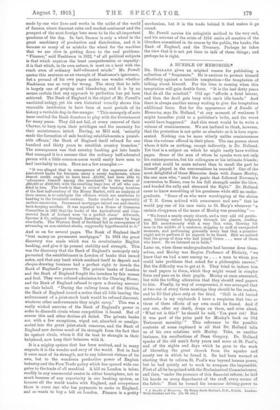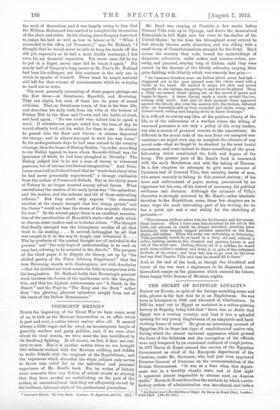A BUNDLE OF MEMORIES.* DE. HOLLAND gives an original reason
for publishing a collection of "fragments." He is anxious to protect himself
effectively against a terrible temptation—the temptation of talking about himself. For the time is coming when this temptation will gain double force. "It is the last dotty years that do all the mischief." Old age "affords a fatal leisure, and then the devil gets busy with one's idle hands." And there is always another enemy waiting to give the temptation additional force. But for the appearance of A Bundle of Memories, says Dr. Holland, "at any moment of weakness I might hereafter yield to a publisher's bribe, and the worst would have happened." And this worst would be to write a volume of reminiscences. We are inclined to think, however, that the protection is not quite so absolute as it is here repre- sented. Nothing can be more utterly unlike reminiscences than the volume offered in their place. The one person about whom it tells us nothing, except indirectly, is Dr. Holland. Yet that is a subject on which he might easily have written pages. Some of the men of whom ho speaks were not only,
his contemporaries, but his colleagues or his intimate friends; and what could be more natural than to recall the part be himself played in the conversations he records P One of the most delightful of these Memories deals with James Motley, the one man who, "amid the panic that followed Newman's conversion to Rome, rose to his full strength under the blow, and headed the rally and stemmed the flight." Dr. Holland.
came to know something of his greatness while still an under- graduate. " Some of us who were worshipping at the shrine of T. H. Green noticed with amazement and awe " that he would pay one of his rare visits to St. Mary's whenever "a certain clergyman of the name of Mozley was preaching":— "We found a nearly empty church, and a very odd old gentle- man, blinking rather helplessly through his glasses, reading his MS. monotonously with a very thin voice, blowing his nose in the middle of a sentence, stopping to sniff at unexpected moments, and performing generally every feat that a preacher ought not to perform if ho expects to be heard. Still we noticed that the group of dons who bad joined Green . . . were of those who knew. So we listened on in faith."
Later on, when these undergraduates had become dons them- selves, and Mozley was Regius Professor of Divinity, " we knew that we had a seer among us . . . a man to whom you could take problems that asked for a philosophic answer." But the difficulty was to get at it. They tried to induce him to read papers to them, which they might recast in simpler form and pass on to their pupils. Mozley at once, consented, but with the trifling alteration that they should read papers to him. Finally, by way of compromise, it was arranged that at two out of every three meetings they should be the readers, and he fill that place only at the third. "Still in. old buried notebooks in my cupboards I have a suspicion that two or three of these efforts of my own could be found. And if any one, after my death, drops on them, and cries aloud, What rot is this P' he should be told, Yes, pure rot! But it was part of the price paid for Mozley's book on Old Testament morality.'" This reference to the possible contents of some cupboard is all that Dr, Holland tells us of his own relations with Mozley. Take, as another instance, his recollections of Dean Gregory. Dr. Holland speaks of the old man's forty years and more at St. Paul's, and of the nights and days which he gave to the work of liberating the great church from the squalor and scanty use in which he found it. He had been warned at starting that to reform St. Paul's was beyond human power, but he had quietly set to work to compass the impossible. First of all he bargained with the Ecclesiastical Commissioners; and then, "under the pressure of this financial reform, he laid his hands on every department of the staff, every corner of the fabric." Next he turned his immense driving-power to • A Bundle of Armories. By Henry Scott Holland, D.D., D.Litt. Loudon; Wells earduer and Co. f7s. ed. net.]
the 'work of decoration, and it was largely owing to him that Sir William Richmond was enabled to complete the decoration of the choir and aisles. In his closing years Gregory knew how to resign his task as well as how to labour at it. " When I succeeded to the office [of Treasurer]," says Dr. Holland, " I thought that he would never be able to keep his hands off the old job, especially ae he bad a most kindly contempt, I felt sure, for my financial capacities. Yet never once did he try to put in a finger, never once did he touch it again." For nearly half of Gregory's long career at St. Paul's Dr. Holland had been his colleague, yet this sentence is the only one in which he speaks of himself. There must be ample material still left for that volume of reminiscences which he is trying so bard not to write.
The most generally interesting of these papers perhaps are the first three—on Swinburne, Meredith, and Browning. They are slight, but each of them has its piece of sound criticism. That on Swinburne treats of him in his later life, and describes his daily walk from his villa at the bottom of Putney Hill to the Rose and Crown, and the bottle of stout, and back again. " No one could ever induce him to speak a word. If adventurous people asked him the time of day be would silently hold out his watch for them to see. In silence be passed into the Rose and Crown : in silence deposited the charge : and in silence emerged to work his way home." In his undergraduate days he had once retired to the country vicarage, then the home of Bishop Stubbs, "in order, according to our Balliol legend, to learn where Ramoth-Gilead was, for ignorance of which he had been ploughed in 'Divinity.' The Bishop judged him to be not a man of strong or vehement passions, but of intense intellectual imagination." And Swin- burne once told an Oxford friend that he "wrote best about what he had never personally experienced," a strange confession from the author of Poems and Ballads. But in the thirty years at Putney he no longer counted among actual forces. What carried a way the readers of his early lyrics was " the splendour, and the motion, and the cadence and lilt of those enthralling refrains." But they could only express " the elemental emotion at the simple thought that fair things perish," and the theme "could not bear the strain of this majestic rhetoric for ever." In the second paper there is an excellent examina- tion of the peculiarities of Meredith's style—that style which so charms some readers and so irritates others. " The thought that finally emerged was the triumphant residue of all that went to its making. . . . It arrived, bedraggled by all that was caught in it in the way to tangle and withstand it. . . . The by-products of the central thought are all included in the process," and "the only hope of understanding is to read on very fast, refusing to be arrested in the details." The purpose of the third paper is to dispute the theory, set up by "the skilled gentry of the Times Literary Supplement," that the true Browning stands with Shakespeare, not with Aeschylus —that his intellectual work counts for little in comparison with his imagination. Dr. Holland holds that Browning's greatest work involves the fusion of the intellectual with the imagine- tive, and that his highest achievements are "A Death in the Desert" and the Pope in "The Ring and the Book" rather than "the glowing, glorious splendour caught from out of the heart of the Italian Renaissance."



































 Previous page
Previous page